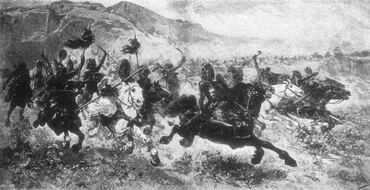1
2 He who is wounded by crushing, or has his testes cut··off, shall not come into the assembly of Jehovah.
2
3 A bastard shall not come into the assembly of Jehovah; even to his tenth generation shall he not come into the assembly of Jehovah.
3
4 An Ammonite or Moabite shall not come into the assembly of Jehovah; even to their tenth generation shall they not come into the assembly of Jehovah even··to eternity;
4
5 on account of the matter that they came· not ·before you with bread and with water in the way, when you came··out from Egypt; and that they hired against thee Balaam the son of Beor of Pethor of Aram-naharaim, to curse◦ thee.
5
6 But Jehovah thy God was· not ·willing to hearken to▵ Balaam; and Jehovah thy God turned the curse◦ to a blessing for thee, for Jehovah thy God loved thee.
6
7 Thou shalt not inquire after their peace nor their goodness all thy days to eternity.
7
8 Thou shalt not abominate an Edomite; for he is thy brother; thou shalt not abominate an Egyptian◦; because thou wast a sojourner in his land.
8
9 The sons that are begotten of them shall come into the assembly of Jehovah in their third generation.
9
10 When the camp goes forth against thine enemies, then keep thee from every evil thing.
10
11 When◦ there be among◦ thee a man◦, who is not clean from what befalls him at night, then shall he go··forth outside the camp, he shall not come to▵ the midst of the camp;
11
12 but it shall be, when it turns◦ evening, he shall bathe himself with water; and when the sun sets◦, he shall come to▵ the midst of the camp.
12
13 And a space shall be for thee outside the camp, and thither thou shalt go··forth outside.
13
14 And thou shalt have a peg upon thyself; and it shall be, when thou sittest outside, thou shalt dig therewith, and shalt turn··back and cover what comes from thee.
14
15 For Jehovah thy God walks in the midst◦ of thy camp, to rescue thee, and to give over thine enemies before thee; that thy camp may be holy, and that He not see in thee the nakedness of any thing, and turn··back from after thee.
15
16 Thou shalt not close··in for his lord a servant who has rescued himself to thee from being with his lord;
16
17 but he shall dwell with thee, in among thee, in a place which he shall choose in one of thy gates, in a good place to him; thou shalt not afflict◦ him.
17
18 There shall not be a prostitute from the daughters of Israel, and there shall not be a sodomite of the sons of Israel.
18
19 Thou shalt not bring the hire◦ of a harlot, and the price of a dog, into the house of Jehovah thy God for any vow; for even both of them are an abomination to Jehovah thy God.
19
20 Thou shalt not impose··usury of thy brother; usury of silver, usury of food, usury of any thing that is imposed··as··usury;
20
21 to a foreigner thou mayest impose··usury; but to thy brother thou shalt not impose··usury; so··that Jehovah thy God may bless thee in all that thou puttest··forth◦ thy hand to do in the land whither thou◦ goest··in to possess it.
21
22 When thou shalt vow a vow to Jehovah thy God, thou shalt not delay to pay it; for Jehovah thy God requiring will require it of thee; and it would be sin in thee.
22
23 But when◦ thou shalt forbear to vow, it shall not be a sin in thee.
23
24 That which goes··out of thy lips thou shalt keep and do; as thou hast vowed to Jehovah thy God, it is a freewill offering which thou hast spoken with thy mouth.
24
25 For thou may come into the vineyard of thy companion, and eat grapes as thy soul is satisfied; but thou shalt not put◦ any into thy vessel.
25
26 When thou comest into the standing··grain of thy companion, then thou mayest crop··off the ears with thy hand; but thou shalt not wave a scythe to the standing··grain of thy companion.







